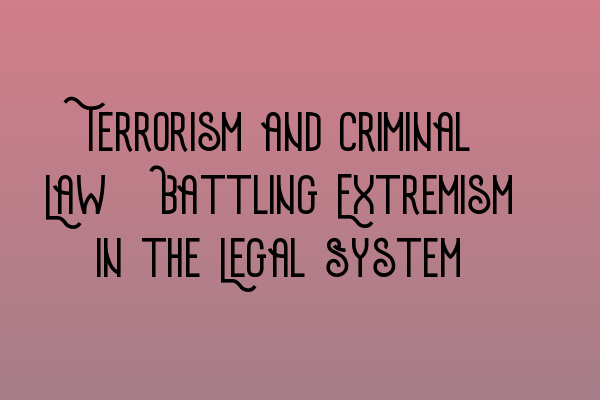Terrorism and Criminal Law: Battling Extremism in the Legal System
When it comes to matters of national security and public safety, the role of criminal law is of utmost importance. In recent years, the rise of terrorism and extremism has posed significant challenges for legal systems worldwide. This article will explore the intersection of terrorism and criminal law in the UK and shed light on the ways in which the legal system addresses these threats.
The Definition of Terrorism under Criminal Law
Defining terrorism is crucial in order to effectively combat and prosecute individuals involved in acts of extremism. In the UK, the Terrorism Act 2000 provides the legal framework for identifying and prosecuting terrorists. This legislation defines terrorism as acts intended to influence the government or intimidate the public, with the aim of furthering political, religious, or ideological objectives.
Under the Terrorism Act 2000, the police and other national security agencies are empowered to investigate and gather evidence to bring those suspected of terrorism to justice. The Act also allows for preventative measures, such as arresting individuals to prevent the commission of terrorist acts. These provisions ensure that the legal system is equipped to tackle threats to national security effectively.
The Challenges Faced by the Legal System
Battling terrorism within the legal system poses several challenges. One significant challenge is striking the right balance between the need for public safety and protecting individual rights and civil liberties. The legal system must ensure that those suspected of involvement in terrorism are afforded due process and a fair trial while safeguarding national security. This delicate balancing act requires careful consideration and adherence to strict legal principles.
Another challenge is the evolving nature of terrorism and extremism. The internet and social media platforms have become breeding grounds for extremist ideologies and recruitment. The legal system must adapt to these technological advancements to effectively identify, investigate, and prosecute those involved in online terrorist activities.
Combatting Terrorism: The Role of Solicitors and Lawyers
Solicitors and lawyers play a vital role in the fight against terrorism. They provide legal representation for individuals accused of terrorism-related offenses, ensuring their rights are protected throughout the legal process. Solicitors who specialize in criminal law are well-versed in the Terrorism Act 2000 and related legislation, enabling them to navigate the complexities of terrorism cases.
Moreover, solicitors can assist in preventative measures by advising government bodies and organizations on legal frameworks and strategies to counter terrorism and extremism. Their expertise in criminal law and knowledge of the legal system are invaluable in developing effective policies and initiatives.
At SQE Criminal Law & Practice Law UK, we offer comprehensive legal services for terrorism-related cases. Our team of expert solicitors is equipped with the necessary knowledge and experience to handle even the most complex terrorism cases. With our SQE 1 and SQE 2 preparation courses, we ensure that our solicitors are up-to-date with the latest legal developments.
Conclusion
Terrorism poses significant threats to national security, and the legal system plays a crucial role in combating extremism. Through the Terrorism Act 2000 and other legislation, the UK legal system has established a robust framework to deal with terrorism-related offenses. Solicitors and lawyers are instrumental in upholding the principles of justice and ensuring that the rights of individuals, even those accused of terrorism, are protected.
